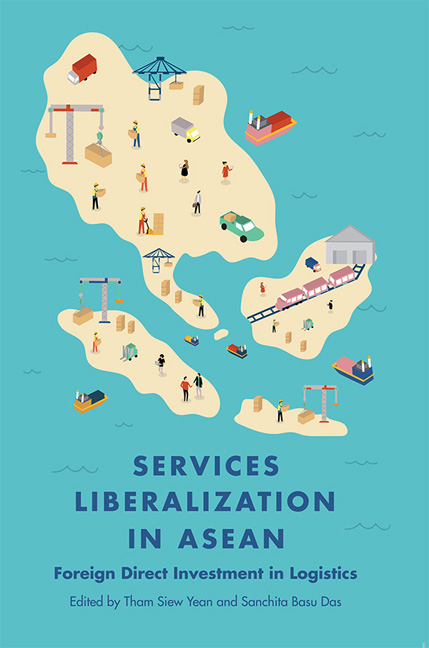Book contents
- Frontmatter
- CONTENTS
- List of Tables
- List of Figures
- Foreword
- Preface
- Acknowledgements
- Abbreviations
- About the Contributors
- 1 Introduction
- 2 Reforming Indonesia's Logistics Sector
- 3 FDI Liberalization in Malaysia's Logistics Services
- 4 Logistics Services Liberalization in the Philippines
- 5 Services Sector Liberalization in Singapore: Case of the Logistics Sector
- 6 Logistics Services Liberalization in Thailand
- 7 Services Liberalization in Vietnam: The Case of FDI in Logistics Sector
- 8 Services Liberalization: Case of Logistics in Brunei
- 9 FDI, Services Liberalization and Logistics Development in Cambodia
- 10 Services Liberalization in Lao PDR: FDI in Logistics Sector of a Land-linked Country
- 11 Facilitating FDI for the Logistics Sector in Myanmar: Agency, Incentives, and Institutions
- Index
11 - Facilitating FDI for the Logistics Sector in Myanmar: Agency, Incentives, and Institutions
Published online by Cambridge University Press: 04 July 2018
- Frontmatter
- CONTENTS
- List of Tables
- List of Figures
- Foreword
- Preface
- Acknowledgements
- Abbreviations
- About the Contributors
- 1 Introduction
- 2 Reforming Indonesia's Logistics Sector
- 3 FDI Liberalization in Malaysia's Logistics Services
- 4 Logistics Services Liberalization in the Philippines
- 5 Services Sector Liberalization in Singapore: Case of the Logistics Sector
- 6 Logistics Services Liberalization in Thailand
- 7 Services Liberalization in Vietnam: The Case of FDI in Logistics Sector
- 8 Services Liberalization: Case of Logistics in Brunei
- 9 FDI, Services Liberalization and Logistics Development in Cambodia
- 10 Services Liberalization in Lao PDR: FDI in Logistics Sector of a Land-linked Country
- 11 Facilitating FDI for the Logistics Sector in Myanmar: Agency, Incentives, and Institutions
- Index
Summary
Introduction
After a few decades of self-imposed economic isolation under the Burmese Socialist Programme Party, Myanmar began to embark upon a gradual and staggered journey to reintegrate with the global economy in the 1990s. In 2011, the government under President U Thein Sein introduced a series of liberalization measures in selected sectors. The recent transition from semi-military to democratic government and the concomitant removal of the US sanctions presented a strategic window to further facilitate Myanmar's integration into the regional and global economy. Myanmar also chaired the 2014 ASEAN Summit and was granted observer status in the 2014 G20 Summit.
Although successive governments have stressed the critical and central role of the development of infrastructure in Myanmar's economic development, the logistics sector has yet to receive dedicated policy attention. This chapter draws attention to the role of the logistics sector in overcoming some of more critical challenges in the formation of positive linkages between Myanmar's economy and the global value chains (GVCs). Facilitating foreign direct investment (FDI) in logistics infrastructure and services is a critical link for domestic enterprises to participate in GVCs. It will also help to create productivity gains through the use of new technology and generate positive spillovers through linkages with local service providers. In this chapter, we discuss two interlocking layers of challenges, namely, governance of FDI and governance of the services and logistic sector in Myanmar's development strategy.
The chapter examines various issues of agency in the governance of the services sector and posits that agency issue at the national level, manifests itself as an issue of coordination given the vast differences in information and incentives amongst multiple principals (focal agencies) and agents (implementing agencies) in terms of negotiation and implementation of agreements. However, at the local level, “thinness” of the presence of government agencies in regulating and monitoring economic activities at the border leads to limited agency of the state in the governance of the services and logistics sectors. Second, it is important to induce inflows of FDI into the logistic sector in the broader context of regulatory and institutional reforms in order to create an enabling ecosystem for logistics in Myanmar.
- Type
- Chapter
- Information
- Services Liberalization in ASEANForeign Direct Investment in Logistics, pp. 330 - 360Publisher: ISEAS–Yusof Ishak InstitutePrint publication year: 2017



